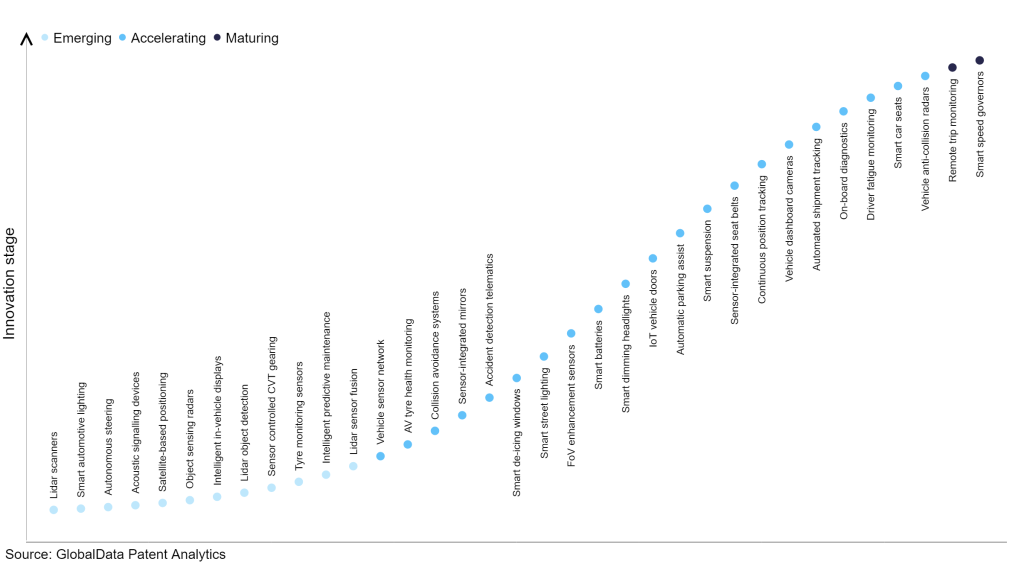The automotive industry continues to be a hotbed of patent innovation. Activity in tire monitoring sensors is driven by the need to increase safety and improve vehicle stability, reduce the risk of accidents, improve fuel efficiency, and growing importance of technologies such as 5G connectivity, integrated systems, artificial Intelligence (AI). In the last three years alone, there have been over 1.7 million patents filed and granted in the automotive industry, according to GlobalData’s report on Internet of Things in automotive: tire monitoring sensors. Buy the report here.

Discover B2B Marketing That Performs
Combine business intelligence and editorial excellence to reach engaged professionals across 36 leading media platforms.
However, not all innovations are equal and nor do they follow a constant upward trend. Instead, their evolution takes the form of an S-shaped curve that reflects their typical lifecycle from early emergence to accelerating adoption, before finally stabilizing and reaching maturity.
Identifying where a particular innovation is on this journey, especially those that are in the emerging and accelerating stages, is essential for understanding their current level of adoption and the likely future trajectory and impact they will have.
300+ innovations will shape the automotive industry
According to GlobalData’s Technology Foresights, which plots the S-curve for the automotive industry using innovation intensity models built on over one million patents, there are 300+ innovation areas that will shape the future of the industry.
Within the emerging innovation stage, LiDAR scanners, smart automotive lighting, and autonomous steering are disruptive technologies that are in the early stages of application and should be tracked closely. Vehicle sensor network, AV tire health monitoring, and collision avoidance systems are some of the accelerating innovation areas, where adoption has been steadily increasing. Among the maturing innovation areas are remote trip monitoring and smart speed governors, which are now well established in the industry.
Innovation S-curve for Internet of Things in the automotive industry

Tire monitoring sensors is a key innovation area in Internet of Things
Tire monitoring sensors are devices installed in tires to collect data related to tire performance. These sensors can detect parameters such as pressure, temperature, and tread condition, which can be used to improve safety on the road. Monitoring sensors help extend the life of tires by ensuring they are not over-or under–inflated, reducing wear and tear.
GlobalData’s analysis also uncovers the companies at the forefront of each innovation area and assesses the potential reach and impact of their patenting activity across different applications and geographies. According to GlobalData, there are 30+ companies, spanning technology vendors, established automotive companies, and up-and-coming start-ups engaged in the development and application of tire monitoring sensors.
Key players in tire monitoring sensors – a disruptive innovation in the automotive industry
‘Application diversity’ measures the number of applications identified for each patent. It broadly splits companies into either ‘niche’ or ‘diversified’ innovators.
‘Geographic reach’ refers to the number of countries each patent is registered in. It reflects the breadth of geographic application intended, ranging from ‘global’ to ‘local’.
Bridgestone is one of the leading patent filers in tire monitoring sensors. The company introduced smart strain sensor technology, which helps to measure the dynamic change in strain that occurs when a tire is in use. Compagnie Generale des Etablissements Michelin, Yokohama Rubber, and Denso are some other key patent filers in tire monitoring sensors.
In terms of applications diversity, Korean Air Lines leads the pack, while Nippon Soken and Sokensha stood in the second and third positions, respectively. By means of geographic reach, Nitto Denko held the top position followed by Kobe steel and Nokian Tyres.
To further understand the key themes and technologies disrupting the automotive industry, access GlobalData’s latest thematic research report on Internet of Things (IoT) in Automotive.
Data Insights
From

The gold standard of business intelligence.
Blending expert knowledge with cutting-edge technology, GlobalData’s unrivalled proprietary data will enable you to decode what’s happening in your market. You can make better informed decisions and gain a future-proof advantage over your competitors.





